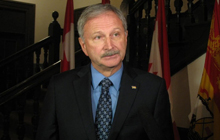New Brunswick: New municipal fiscal framework announced by N.B. government

Expanded funding from the province is welcome news to New Brunswick municipalities, but a property assessment freeze has withered its delivery
Saint Croix, NB, May 9, 2025 – The provincial government has shed a small light on the funding model that will become available to municipalities.
Local Government Minister Aaron Kennedy tabled new amendments in the Legislative Assembly on Wednesday to the Community Funding Act. It details the amounts of money that will be given out next year.
It is part of a commitment to expand the funding to about $188 million by 2030, just shy of the more than $200 million dollar gap in funding identified by the Union of Municipalities of New Brunswick (UMNB).
According to the department, the funding model breaks down as follows:
Fiscal Capacity Fund – $75 million. This fund will replace the existing Community Funding Grant.
Regional Services Support Fund – $18 million. This fund will help regional service commissions implement their regional strategies. It can be used to supplement up to 50 per cent of the total funding for eligible initiatives.
Capital Renewal Fund – $45 million. This new fund will support the improvement and replacement of existing municipal infrastructure.
It did not reveal where the money was being drawn from, or how the money would be allocated between the municipalities.
On Wednesday, Kennedy was expected at the legislature at 10 a.m., and several journalists were unable to ask questions about the topic – including about the infrastructure deficits facing many smaller municipalities and the funding regulations, which has concerned Charlotte County municipal councils.
The Courier has reached out for another opportunity to ask questions about the new amendments to gather a better understanding and is awaiting a response.
It came one day after the government announced it would freeze property assessments for one year.
Local governments are funding only by property assessments, distributed to them by the province.
“We heard it at the doors, very frequently last year when I was campaigning and I know my colleagues and candidates from all political parties heard the same thing: you as government need to do something,” he said during the press conference. “This is a temporary measure … to continue our work to come up with a robust and thorough overhaul of property and property assessments in New Brunswick.”
The property assessment freeze does not apply to new construction or renovations, something Kennedy suggested municipalities could take advantage of.
“There are many municipalities that won’t have an actual freeze on their revenues, they will still continue to grow, and they might have to make some difficult decisions,” he said.
Dan Murphy, the executive director of the Union of Municipalities of New Brunswick, said municipalities are already making difficult decisions.
He said the extra funding is good news, but the property assessment freeze has withered the delivery of it.
“Both Minister Kennedy and Minister Legacy have both said that municipalities may have to raise rates because of this move. So, the question becomes, this isn’t an affordability measure then,” he said in an interview with The Courier. “It’s just a way to pass the buck and put pressure on municipalities. And that’s unfortunate and it’s disheartening. And it’s not in the spirit of collaboration that the government put forward.”
According to UMNB, the property assessment is expected to result in a $58 million shortfall for local governments.
He said that the assessment freeze will mean municipalities will have to raise the tax rate or cut services – something he said the membership doesn’t want to do.
“We had hoped to work in partnership with the government to target that affordability to people who need it the most,” he said.
Murphy said he believes the funding is being sourced from general revenues, but isn’t entirely sure either. He expects further details may be available in the next few months.
“There wasn’t a consultation process on this, and it’s really just a move that puts pressure on our folks who have the least amount of ability and the least amount of new revenue sources to offset that work,” he said.
He also explained delaying infrastructure projects is becoming less of an option and there is continued pressure to deal with issues that are the mandate of the provincial government – including homelessness, housing, healthcare and childcare.
“Increasingly, the municipalities have been supporting provincial services and the province hasn’t been doing a very good job of allocating,” he said.
Murphy said the municipalities also want affordability for New Brunswickers, and there is no government closer to its constituency.
“We share the same goals. We want affordability for our citizens,” he said. “We want doctors in our communities. We want good recreation opportunities. We want all of these things and municipalities are the best positioned partner to do that work. But, in this case, if you tie our hands behind our back, we can’t do the work.”
Nathalie Sturgeon is a Local Journalism Initiative reporter with the Saint Croix Courier in New Brunswick. Title image by Miguel Ángel Sanz on Unsplash.





(0) Comments